by M. C. Jennings | May 3, 2023 | Academics, Current Students, Faith Infusion, Research, School of Information Technology and Computing, Student Spotlights, Uncategorized
Written by special contributor Lance Fleming
Each day, students across the ACU campus display the university’s mission to educate students for Christian service and leadership throughout the world through their actions and acts of service on the campus. Each year, students like those are nominated by their academic departments. From those nominations, 50 scholars are selected by the ACU Faculty Senate to receive the University Scholars Award for their graduating class.
Among those 50 scholars who demonstrated outstanding scholarship by maintaining a grade point average (GPA) of 3.5 or higher, earning 90 hours towards their degree, and continuing the pursuit of knowledge in their research field, seven are students from the College of Business Administration. The COBA students who received this year’s University Scholars Award are Kathryn Crawford, Gracie Isham, Matthew Roberson, Will Harris, Diego Lozano Welsh, Ben Blackmon, and Garrett Powell.
We will highlight each of the seven over the next month, including this profile of Garrett Powell, a native of Aledo, Texas, who carries a 3.9 GPA while majoring in computer science with a focus on software engineering and minoring in mathematics. Garrett – who has been working as an intern for Funeral Directors Life Insurance Company – will go to work with FCLIC as a DevOps Developer.
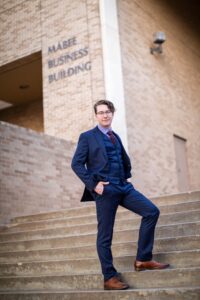 While at ACU, Garrett has been heavily involved in academic and campus life pursuits. He has served as Dr. James Prather’s research assistant, researching metacognition, programming error messages, and novice programmers. Seven of his articles have been published on various platforms over the last three years.
While at ACU, Garrett has been heavily involved in academic and campus life pursuits. He has served as Dr. James Prather’s research assistant, researching metacognition, programming error messages, and novice programmers. Seven of his articles have been published on various platforms over the last three years.
He’s also the chairman of the local ACM SIGCHI Chapter and is president of the ACU Swing Cats, the swing dance club on campus. Garrett has been with the group since the fall of his freshman year (2019-20) and was with the group on April 29 when it celebrated its 20th anniversary with a dance at the Elks Ballroom.
Garrett recently answered a few questions about his time at ACU and in COBA, covering everything from his most influential class and professor to the most impactful thing he’s been a part of while at ACU:
Q: What is the most important thing you’ve learned about yourself at ACU?
Powell: “Learning to interact and communicate with people from different areas of life, whether from other majors or societal backgrounds.”
Q: What professor or class has impacted you most and why?
Powell: “James Prather has by far been the most influential professor. He picked me up as a research assistant in the spring of my freshman year and has been a mentor ever since. He introduced me to the many ways we can improve people’s lives by implementing accessibility tools on our software. The most influential class would have actually had to have been a two-part class. Software 1 and 2, taught by Brent Reeves, greatly impacted me. He helped implement projects that reflected what working in the real world was like. It did a great job preparing me for what I see in my job day to day.”
Q: Of all the things you’ve experienced at ACU, what do you believe will have the most impact on your life?
Powell: “Being involved in Swing Cats has been the most influential part of my college experience. It brought me out of my comfort zone and moved me into a leadership position.”
by M. C. Jennings | Apr 29, 2023 | Academics, Accounting, Current Students, Faith Infusion, Social Entrepreneurship, Student Spotlights, Uncategorized
Written by special contributor Lance Fleming
Each day, students across the ACU campus display the university’s mission to educate students for Christian service and leadership throughout the world through their actions and acts of service on the campus. Each year, students like those are nominated by their academic departments. From those nominations, 50 scholars are selected by the ACU Faculty Senate to receive the University Scholars Award for their graduating class.
Among those 50 scholars who demonstrated outstanding scholarship by maintaining a grade point average (GPA) of 3.5 or higher, earning 90 hours towards their degree, and continuing the pursuit of knowledge in their research field, seven are students from the College of Business Administration. The COBA students who received this year’s University Scholars Award are Kathryn Crawford, Gracie Isham, Matthew Roberson, Will Harris, Diego Lozano Welsh, Ben Blackmon, and Garrett Powell.
We will highlight each of the seven over the next month, starting with Gracie Isham, the youngest of the four Isham siblings to attend ACU. A native of Decatur, she is a member of Ko Jo Kai, has served on the Executive CEO Leadership Board and the Executive Philanthropy Board, and sang in the Foundation and Grace Note a capella groups.
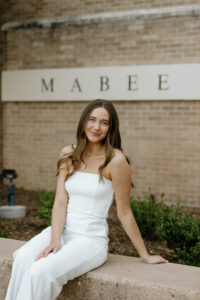 A double major in accounting and finance, she has already accepted a job offer at Weaver, an accounting firm in downtown Fort Worth. She is in the process of applying to schools across Texas so she can work toward getting her MBA.
A double major in accounting and finance, she has already accepted a job offer at Weaver, an accounting firm in downtown Fort Worth. She is in the process of applying to schools across Texas so she can work toward getting her MBA.
Gracie recently answered a few questions about her time at ACU and in COBA, covering everything from her most influential class to the most unique thing she’s been a part of while at ACU:
Q: What is the most important thing you’ve learned about yourself at ACU?
Isham: “The most important thing I have learned is that we all need community, and that community looks different for each individual. As I’ve gone through the troughs and peaks of college, my community has kept me stable and looking toward my purpose: to be a good steward of God’s gifts. With this being said, my definition of community has changed throughout my time here. I would have used to say that community looks like being plugged in with a vast group of people across all areas and interests in my life. Still, as my time in college ends, my definition of a true community has changed to this: my caring roommate that sews the hole in my shirt, my lifetime friend that walks my dog while I’m sick, my friend that offers me a prayer whenever I need, and my family who constantly supports all of my future ideas. Community isn’t about quantity but the quality of people who know you best.”
Q: What professor or class has impacted you most and why?
Isham: “The class that had the most impact on me was the strategic philanthropy class I am currently taking (The why behind this answer is located in the last question!).”
Q: What has been your experience in COBA?
Isham: “COBA has been a great experience overall. It has offered me many opportunities to grow by presenting me with leadership opportunities, networking events, and an overall supportive environment with people who want to see me succeed!”
Q: Of all the things you’ve experienced at ACU, what do you believe will have the most impact on your life?
Isham: “ACU’s constant push toward turning its faculty and students toward God will have the biggest impact on my life. I have grown spiritually through all the big chapels, small group chapels, the professor’s daily class prayers, and constant spaces of worship. The things I gained through these experiences are things I will implement into my life forever.”
Q: What is the most unique thing you’ve been a part of or learned at ACU?
Isham: “The most unique thing I have been a part of at ACU has been sitting as the chairperson of the Strategic Philanthropy Board. I have had the opportunity to visit various non-profits in Abilene and witness God’s good work through the people of each organization. Through this, as a board, we have chosen several non-profits to allocate $50,000 for their use. This has challenged me to engage in more philanthropic endeavors in my life and home community.”
by M. C. Jennings | Apr 21, 2023 | Academics, COBA Faculty, Current Students, Faith Infusion, International Business, Social Entrepreneurship, Uncategorized
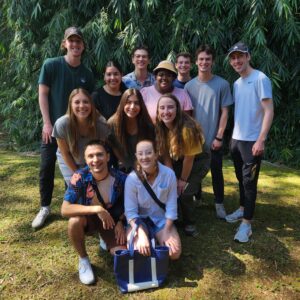 Written by special contributor Lance Fleming
Written by special contributor Lance Fleming
While most students around the country spent their Spring Break taking a break from college work and getting away from all things academia, 10 ACU students and their two professors spent a week in Costa Rica as part of the requirement for COBA’s Social Enterprise Consulting Class working with local entrepreneurs to launch products made from materials donated by Southwest Airlines.
Dr. Laura Phillips and Dr. Jennifer Golden are teaching the class this semester and took the students to Costa Rica to work with the husband-and-wife duo of Lynne Corvaglia and Chris Riquelme, who are creating “upcycled” bags and other products from leather donated by the United States’ busiest airlines.
As part of Southwest Airlines’ “Repurpose with a Purpose” program, each of the company’s fleet of airplanes is overhauled every four years, and as a part of that process, the seat leather is replaced. The leather pulled out of the planes is donated to nonprofit organizations for upcycling projects. One of the Southwest refurbishment facilities is in El Salvador, and the leather from that location has been donated to a university in Turrialba, Costa Rica, called CATIE.
CATIE is primarily an agricultural university, but it does have economic development as an area of focus.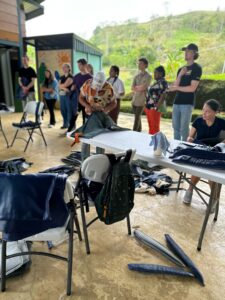 That is part of the university with which ACU students have partnered this semester. In addition to donating a warehouse full of airline seats, Southwest has also provided funds for CATIE to build a leatherworking workshop and to provide training for people in the area who are interested (primarily women). The women come from around the region to learn leatherworking and business skills.
That is part of the university with which ACU students have partnered this semester. In addition to donating a warehouse full of airline seats, Southwest has also provided funds for CATIE to build a leatherworking workshop and to provide training for people in the area who are interested (primarily women). The women come from around the region to learn leatherworking and business skills.
The idea is to create a business incubator to launch businesses as people graduate from the training program. Jobs are also being created in rural communities because CATIE receives intact seat covers that must be deconstructed before they can be upcycled into new products.
And that’s where the ACU students come in.
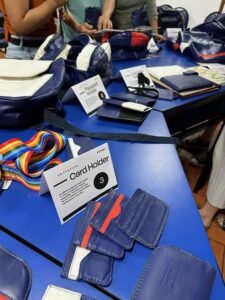 The students’ client is called Wearsos – the first business to come out of the leather project – and it was started by Corvaglia and Riquelme. Aside from upcycled bags, the company also plans to make other products like passport holders, wallets, luggage tags, and shoes, but according to Phillips, the initial launch will be with three different styles of bags.
The students’ client is called Wearsos – the first business to come out of the leather project – and it was started by Corvaglia and Riquelme. Aside from upcycled bags, the company also plans to make other products like passport holders, wallets, luggage tags, and shoes, but according to Phillips, the initial launch will be with three different styles of bags.
“Our task this year is to support Lynne and Chris as they get ready to launch their products,” Phillips said. “While we were in Turrialba, Costa Rica, we conducted focus groups with two different target markets: faculty, staff, and students on the CATIE campus, as well as Southwest Airlines employees.
“The first set of focus groups were done in person, while the Southwest Airlines focus groups were conducted via Zoom,” she said. “Our students are sorting through the information we collected through those sessions to provide marketing help to Lynne and Chris as they decide how to position the three products. That will also allow us to help them with information about shipping because they are working through the logistics of getting products from Costa Rica to the United States and Canada.”
The goal for the class, Phillips said, is to complete “one or two” consulting projects for the client, in this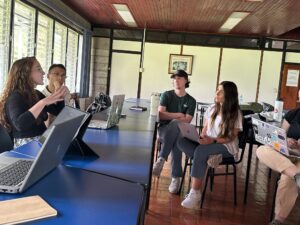 case, Wearsos. So far, in four years of teaching the class, each client has been in Costa Rica, although Philips said future classes could certainly take on a domestic client or a client in a foreign country other than Costa Rica. Phillips also said that she wants the students to learn problem-solving and critical-thinking skills each year to serve them when they enter the workforce.
case, Wearsos. So far, in four years of teaching the class, each client has been in Costa Rica, although Philips said future classes could certainly take on a domestic client or a client in a foreign country other than Costa Rica. Phillips also said that she wants the students to learn problem-solving and critical-thinking skills each year to serve them when they enter the workforce.
What the students will find, Phillips said, is that the context and scope of the project will always change between the start of the semester and the time they return from the Spring Break trip. In addition, the on-site schedule over Spring Break is always fluid, forcing students to adjust their plans, which is more difficult for some students than others.
“We want the students to become much more comfortable dealing with ambiguity and learning to be flexible, both in a project context and a general life context,” Phillips said. “We hope the students learn how to be good team members. Most students have had several group projects by this point in their college careers. In many of these cases, the work is distributed unevenly across the team, with some students pulling more than their weight and others free riding. This is an opportunity for them to work in a group where everyone wants to be involved and contribute.
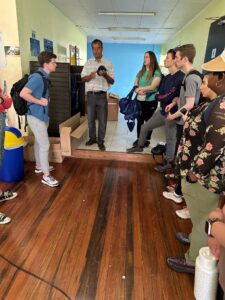 “Finally, we hope the students will learn that consulting (and any cross-cultural project) is a co-creation between the parties involved,” she said. “We do not go to Costa Rica to solve our clients’ problems or fix their issues. We work with the client to develop solutions that will work in their context. We try hard to squash the ‘savior’ complex that people in general – and Americans specifically – sometimes bring to other contexts. We also try to cultivate the idea that everyone has valuable ideas and skills to bring to the project.”
“Finally, we hope the students will learn that consulting (and any cross-cultural project) is a co-creation between the parties involved,” she said. “We do not go to Costa Rica to solve our clients’ problems or fix their issues. We work with the client to develop solutions that will work in their context. We try hard to squash the ‘savior’ complex that people in general – and Americans specifically – sometimes bring to other contexts. We also try to cultivate the idea that everyone has valuable ideas and skills to bring to the project.”
The class was not only beneficial for the entrepreneurs and partners in Costa Rica but also for the students that attended. For many, it was life-changing. Senior marketing major, Angel Smith, said, “I learned new things from a brand-new culture and was humbled by the experience. This experience has influenced my current professional goals in changing the purpose behind applying meaningful work that can serve a higher purpose. It also humbled my experience of what it means to be successful; on our trip, Dr. Eliecer Vargas, the professor at CATIE who is in charge of the leatherworking project, said that finding happiness in your worth is also finding happiness from within, not just looking for monetary value. This past semester, I have worried about finding a job that will bring financial gain, but this trip has shown me that there is value in the community you surround yourself with. Five years from now, I could see myself working for a company with a program or even starting an outreach program supporting giving back and empowering communities in need.”
Angel’s words echo the mission and values of the College of Business: As a Christian college of business and technology, we call our members to faith and vocation, learning and innovation, students and relationships, and excellence and impact. We can’t wait to see what fruit comes from the seeds that have been planted for both our partners and our students.
by M. C. Jennings | Apr 3, 2023 | Academics, Alumni Spotlight, Current Students, Management, Marketing, Uncategorized
Written by special contributor Lance Fleming
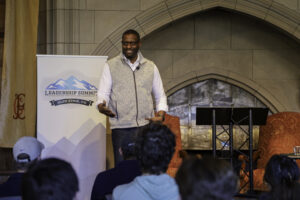 The headlines splashed across newspapers and websites around the country last December and into January certainly weren’t flattering for Southwest Airlines. The airline –annually among the leaders of all airlines in the United States in customer satisfaction – wasn’t making anyone happy with thousands of delayed or canceled flights that left travel-weary customers stranded in airports across the country as they scrambled to return home after the holidays.
The headlines splashed across newspapers and websites around the country last December and into January certainly weren’t flattering for Southwest Airlines. The airline –annually among the leaders of all airlines in the United States in customer satisfaction – wasn’t making anyone happy with thousands of delayed or canceled flights that left travel-weary customers stranded in airports across the country as they scrambled to return home after the holidays.
A massive winter storm caused the initial flight delays and disruptions and turned into a disaster that cost more than $800 million in lost revenue and refunds and reimbursements to customers.
Customer satisfaction fell off, and many Southwest passengers swore they’d never use the airline again after the experience.
Standing in the middle of the storm was ACU graduate Tony Roach (’01), who has been with the airline since 2001, shortly after he graduated with a BBA in Marketing and Management. He started at Southwest as a Field Marketing Coordinator, working his way up the corporate ladder by serving in customer-impacting roles across field marketing, corporate sales, product development, loyalty marketing, customer relations, and customer experience.
Roach has also been tasked with establishing the customer experience corporate function, leading the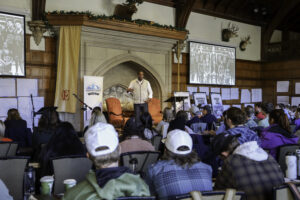 Southwest Promise (the company’s COVID response for customers), spearheading the digital self-service and cabin modernization programs, and executing several other impactful initiatives that continue to generate revenue and improve customer satisfaction.
Southwest Promise (the company’s COVID response for customers), spearheading the digital self-service and cabin modernization programs, and executing several other impactful initiatives that continue to generate revenue and improve customer satisfaction.
In January 2023, he was promoted to Senior Vice President for Marketing and Customer Experience. He will lead the company’s efforts in marketing, product & customer loyalty, digital, customer experience, and customer engagement. Roach’s organization drives customer demand, evolves the Southwest brand, and designs an end-to-end travel journey that maximizes revenue and customer loyalty.
All that to say that Roach leads the departments that have to restore trust in the Southwest brand and win back the customers who were turned off by the problems they experienced during the company’s nightmare winter.
Roach –married and has four children – was recently asked to speak to faculty and students at the annual Leadership Summit in Colorado, touching on various aspects of his Christian leadership style in a secular world and how he has helped lead Southwest Airlines through its most recent trials.
He recently sat down for a question-and-answer session covering everything from his experiences at ACU and in COBA to the company’s response to COVID and the holiday crises. Below is that conversation:
Q: When you look back on your experience at ACU and in COBA, who are some of the people who most influenced you, and what did you take away from them that you’ve carried with you in the corporate world?
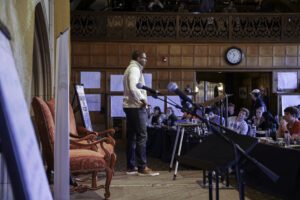 Roach: There are so many people across COBA that I could name. I might not have had direct contact with them, but I recognized they were trying to do things the right way, which made an impact. I really looked up to Dr. (Rick) Lytle, Dr. (Phil) Schubert, and Tim Johnston. Dr. (Gary) McCaleb was one of the most influential people on campus, and I’m forever indebted to him. I was one of the founding members of the LYNAY (Love Your Neighbor As Yourself) group that he led for many years, and he poured into and invested in me. He influenced me in so many ways, including pushing me to strive to be the best I can be in every facet of my life, whether it be in my spiritual life, family, or job. He saw more potential in me than I even saw in myself.
Roach: There are so many people across COBA that I could name. I might not have had direct contact with them, but I recognized they were trying to do things the right way, which made an impact. I really looked up to Dr. (Rick) Lytle, Dr. (Phil) Schubert, and Tim Johnston. Dr. (Gary) McCaleb was one of the most influential people on campus, and I’m forever indebted to him. I was one of the founding members of the LYNAY (Love Your Neighbor As Yourself) group that he led for many years, and he poured into and invested in me. He influenced me in so many ways, including pushing me to strive to be the best I can be in every facet of my life, whether it be in my spiritual life, family, or job. He saw more potential in me than I even saw in myself.
Q: Tell me about the company’s response to the COVID pandemic and what you learned from dealing with all the issues that came about.
Roach: The entire industry was hit hard by COVID because so little was known about how the virus spread. The last thing people thought they needed to do was to get on an airplane. We had to modify how we operated and what the experience would be like for those willing to fly. We did many things like requiring masks and blocking middle seats onboard for social distancing; we even changed how we cleaned the plane after each flight. And we did all those things to help make people comfortable flying again. If you think about what that did to business travel, everything stopped because no one was going to the office. Our team led the customer response, and the lesson learned was that you have to adapt and be ready to pivot.
Q: Go back to the challenges that Southwest faced during the winter with the thousands of flight delays and cancellations, as well as, I’m sure, thousands of unhappy customers. How does Southwest rebuild trust with the public?
Roach: Southwest takes immense pride in taking care of its customers. It’s a huge part of our business model. To see us get to a point where we let a lot of customers down was disheartening for the executive team and frontline workers. It was a hard thing to watch, and it’s been hard to navigate. The first thing we had to do during that time was care for our customers. We had to make sure they knew they could get a refund and that we would help make them whole in other areas. That was the first big thing we did. Now we’re working on rebuilding trust with customers. We’ve always had a great brand, but we recognize that rebuilding trust takes time. So how do you do that? For one, you accept the lessons you learned and make sure you move forward and improve yourself. The second thing is consistency. We have to show we can once again be reliable, and over time we will show that. We’re still the airline everyone has loved for so long, and we’ll come out of this better and stronger. Those are tangible things that we can show customers and employees that we will be better.
Q: In these challenges you’ve been dealing with, how much did you lean on what you learned from your father (Abilene minister Dr. Tony Roach) and at ACU about leading with Christ-centered values?
Roach: You can try to remember some of the subject matter you learn in school, but there are things you learn in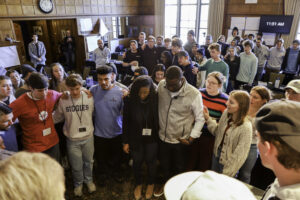 the curriculum, and there are things you learn outside the curriculum. What ACU does is teach you that you can balance a lot of things at once. At ACU, you learn to balance your walk with Christ and academics. You’re blending two things. But I had three when you added athletics (Roach was on the ACU men’s basketball team). Understanding how to pursue and balance what is important to you at once is a skill that can continue to bless your life. I’ve also been lucky to have a father who has given me guidance along the way. He taught me that if you consult with God and walk with Him and abide with Him, He has your back, which keeps everything in perspective. He’s given me a great example; somebody to watch and do things with the right intent.
the curriculum, and there are things you learn outside the curriculum. What ACU does is teach you that you can balance a lot of things at once. At ACU, you learn to balance your walk with Christ and academics. You’re blending two things. But I had three when you added athletics (Roach was on the ACU men’s basketball team). Understanding how to pursue and balance what is important to you at once is a skill that can continue to bless your life. I’ve also been lucky to have a father who has given me guidance along the way. He taught me that if you consult with God and walk with Him and abide with Him, He has your back, which keeps everything in perspective. He’s given me a great example; somebody to watch and do things with the right intent.
Q: You were recently asked to speak at Summit and share your last few months’ experiences. What was your goal in communicating with those students and staff members?
Roach: I was reminiscing that I went to Summit my last year at ACU, so this was a chance to pour back into students sitting in the seats where I once sat. They have so many decisions to come in life and where they’re at. I remember being somewhat overwhelmed by all the decisions that were coming. How do you know what you want to do? If someone had told me then that I’d be doing what I’m doing now, it would have blown me away. I wanted to give them a few things to consider, led by this: what do you think are the principles you need to stay loyal to as you make those decisions? If you remain loyal to the guiding principles, they’ll help guide decisions. And then, I wanted to remind them to be loyal to the gifts that God has given them. We each have values, and if you stay loyal to those, your gift will find its way to you. I reminded them to remain loyal to the Holy Spirit. The gift that God gave all of us is the Holy Spirit. If we stay loyal to listening to the Holy Spirit, that will lead us on our path. Finally, I reminded them to stay loyal to our mission as Christians. We serve the Kingdom. If we stay loyal to serving the mission of the Kingdom, that will guide us in all the decisions we make. My goal through all of that was to tell them it’s OK if they don’t know yet where to go from here. But to stay loyal to their principles because they will guide their paths.
by M. C. Jennings | Mar 23, 2023 | Academics, COBA Faculty, COBA Staff, Current Students, Faith Infusion, Uncategorized
Written by special contributor Lance Fleming
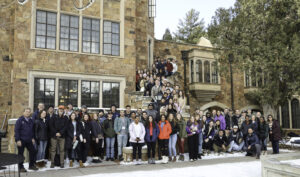
The Leadership Summit Class of 2023
Old friends mingled with new faces once again this year as ACU was able to host Leadership Summit in January, the first time since 2020 that the university’s Christ-focused leadership development course had been able to meet.
Established in 1998 in the College of Business Administration, Summit is a one-week, 3-hour course hosted in picturesque Colorado. The course blends academic rigor with an environment ripe for deep, personal, and lasting encounters with Jesus. The course ran for 23 consecutive years until COVID forced its cancellation in 2021. The group was set to meet at Crooked Creek camp in Fraser, Colorado, in 2022 until a water pipe burst just before everyone arrived, forcing the cancellation of the entire course.
Summit 2023 returned to its birthplace – Glen Eyrie Castle in Colorado Springs, Colorado – where founders Dr. Rick Lytle, Tim Johnston, and Mike Winegaert hosted the first meeting in 1998. The tone for this year’s week-long stay was set by best-selling author Mo Aiken, who spoke on the evening of January 7, kicking off the event.

Mo Aiken
“Mo Aiken was our kickoff speaker, and she crafted such a unique and tailored vision for our students,” said Dr. Dennis Marquardt, Associate Professor of Management and Director of the Lytle Center for Faith and Leadership. “One of my students wrote on his exam, ‘The first night that Mo Aiken spoke, she spoke with such fire and passion that set the tone for the week. She saw something that God desired for this group and was able to inspire all of us to strive for that same vision.’ Mo set a clear tone that living for Christ isn’t an add-on but an all-encompassing relationship upon which everything else is based.”
From there, speakers like Elise Mitchell (‘83), founder of the Mitchell Communications Group, Rick Atchley (‘78), Teaching Minister at The Hills Church of Christ, Tony Roach (‘01), Senior Vice President for Marketing and Customer Experience for Southwest Airlines, Mike Willoughby (‘86), CEO of PFSweb Inc., and Greg Feasel (‘80), President and CEO of the Colorado Rockies – as well as many others – opened their hearts to the attendees. Message after message of openness about sin and struggles and connecting it to leadership took everyone to a place where, as Marquardt said, “we realized that it is in our weakness that we are strong. God delivers and redeems and makes broken things beautiful.”
Jenny Fridge (‘92), Director of Community Relations for The Sanctuary Foster Care Services in Fort Bend County, attends with her husband, Eric (‘91), who is currently the Director of Advancement Officers for the university. She agreed that the spiritual air in 2023 differed from years past.
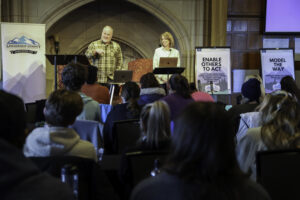
Eric and Jenny Fridge
“Leadership Summit is our favorite way to begin a new year,” Jenny said. “We have lost count, but I think we’ve attended the last seven or eight Summit experiences, and we’ve been a mentor couple for students, and at this Summit, we were able to speak to students on one of the last days of the week to encourage them in their next steps as they headed back to campus.
“While every year is similar, and we even have returning speakers from year to year, each Summit class is uniquely different,” she said. “This year, this group had a notable air of spiritual maturity. While these students have seen their share of brokenness, they also seemed very self-aware, repentant, and committed to their walk with the Lord. There was a maturity in this group that had not been as evident in years past. Personally, this gave me hope and optimism for our future. Case in point: our first grandbaby was born the Monday we were at Summit, and during one of our group sessions that evening, the students asked if they could pray for us! It was a precious moment and meant the world. Again, a simple reflection of the spiritual maturity of this special group.”
One of the event’s founders – Dr. Lytle, who spoke to the group about the transforming power of His presence – said even he sensed a renewed spirit at this year’s meeting.
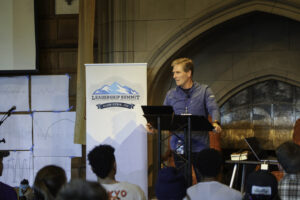
Dr. Rick Lytle
“As I approached Glen Eyrie Castle, my mind flashed back to 25 years ago when we started this dream of pouring into students in a unique way,” he said. “I was hopeful that if we invited God to the mountain to join us, He would favor us with His presence as He did with Moses. I hoped that He would transform us more and more into His image so that we might authentically serve and lead with His power to bless humanity and expand and advance God’s Kingdom work.
“God’s spirit moved palpably among us,” Lytle continued. “Students were changed each day – conversations were different, their thoughts were different, their eagerness was different, and finally, their surrender was more fully leveraged for His glory and pleasure.”
In fact, on the final evening of Summit, four people decided to give their lives to Christ in baptism. Those students didn’t know that when Lytle arrived, he asked the general manager at Glen Eyrie if they had a baptistry, a pond, or a tank in case someone there needed to be baptized. The GM even said to Lytle, “you guys actually do the plunge thing.” Lytle answered in the affirmative.
On the morning of the final day, Shane Jennings (‘89) – husband of ACU’s M.C. Jennings (‘91), the Student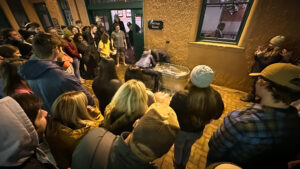 Engagement and Marketing Manager in COBA – went to an ag store in the area and bought a feed trough with the hope that it would need to be used that day. When the staff learned that it would be necessary for four students, they formed a “hot water bucket brigade” to fill the trough for the baptisms, which would take place outside in 20-degree temperatures.
Engagement and Marketing Manager in COBA – went to an ag store in the area and bought a feed trough with the hope that it would need to be used that day. When the staff learned that it would be necessary for four students, they formed a “hot water bucket brigade” to fill the trough for the baptisms, which would take place outside in 20-degree temperatures.
“These awesome students were baptized into Christ by faith on all accounts,” Lytle said. “Dr. Marquardt and I had the privilege of baptizing them in the feed trough. On our departure, we, in faith, left the feed trough there for next year’s use.”
The movement of the Spirit among those who were in Colorado that week was easy to see and feel. And it provided a sense of renewal for Heather Fortner (‘97), current CEO at SignatureFD. She hadn’t participated in an ACU event in 25 years but quickly found that the Holy Spirit was in that place.
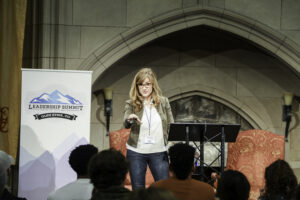
Heather Fortner
“The goodness and faithfulness of Jesus were on full display at this year’s Leadership Summit,” she said. “It’s so easy to forget the power, and holiness one encounters when a group of God-fearing people takes the time to step away from the normal day-to-day of life and seek Jesus wholeheartedly. The opportunity to share my heart and a few lessons I have learned while highlighting how the Lord has guided every step of the journey was a stark reminder of Jesus’s calling for each of our lives.”
Fortner said she prayed for months about what the Lord wanted her to share at this year’s meeting and kept hearing the same two words come back to her: But God. Over the next few weeks, she said, God revealed to her four areas that she has struggled with as a leader and continually needs reminding that He is in charge: fear, focus, forgiveness (of others and self), and faith.
“This was my first Leadership Summit, but I can say the Spirit of the Lord was clearly present and actively working in the hearts of all who were there,” she said.
Allee Casey, who will graduate from ACU in May, was one of 80 students enrolled in Summit 2023, and she said she left Colorado believing each of the 16 speakers she heard over the six days at Glen Eyrie was speaking directly to her.
“It just felt like most of the speakers were talking about issues that I see in my life,” Casey said. “Each
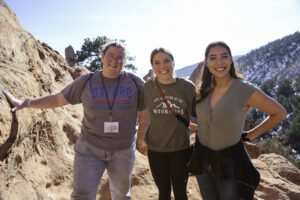
From L to R: Allee Casey, Laura Kate Masters, and Laney Aguilar
speaker had their own message and some personal story that made their lesson all the more impactful. I left each session with a new idea for improving my life. My internal dialogue was no longer ‘That’s just how it is,’ or ‘I was born like this,’ or ‘they’ll never change.’ It was now a hope that I could improve my life and that my decisions and relationships weren’t previously dictated to fail by genetics, fate, or whatever reason.”
All that from someone hesitant to attend the event.
“I was honestly regretting signing up for Summit,” Casey said. “I didn’t need the credit, I had a ton on my plate leading into the new year, and it just seemed like something I didn’t want or need. But I figured since my family was paying for it, I should go in with a good attitude to learn something. And boy, did I learn something. The speakers brought their ‘A-game,’ and everyone could tell and became as invested as I did. It was just such an atmosphere of learning that you don’t normally see, even on a college campus.”
The planning and preparation for Leadership Summit 2024 has already begun. The dates for this one-week, 3-credit, short course are January 6th – 12th. Summit is open to all undergraduate ACU students of any major. To learn about Leadership Summit 2024 you can contact the Lytle Center for Faith and Leadership at lytlecenter@acu.edu or go to lytlecenter.org/summit.
by M. C. Jennings | Nov 2, 2022 | Academics, COBA Faculty, COBA Staff, College Decisions, Current Students, Faith Infusion, Professional Development, Uncategorized
Written by special contributor Lance Fleming
It only takes a few seconds of studying the mission of ACU’s College of Business Administration (COBA) to discern that the holistic development of its students is as important as anything else that goes on in the Mabee Business Building.
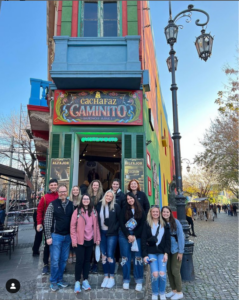
Dr. Andy Little and students during their Study Abroad trip to Montevideo last summer.
The first point of the mission statement is “holistic student learning and development.” That part of the mission goes on to say that ACU “seeks spiritual, academic, and professional growth over the life of each student through exemplary teaching, experiential learning, and relationships with Christian faculty, professional staff, and engaged alumni.”
It’s all part of equipping the next generation of global leaders with all the tools necessary to be successful in their homes, in their places of worship, in their communities, and in their places of work.
“While great teaching is essential to what we do, we want to emphasize how our students learn and develop both inside and outside the classroom,” said Dr. Brad Crisp, Dean of the College of Business Administration. “That is why we are partnering with the university in the design and implementation of the Compass initiative.”
The Compass initiative begins with a customized roadmap showing the key experiences the student can choose during their time at ACU. Then, they can utilize the Compass app or website to gain access to badges and activities that they can pursue at the appropriate times during their journey. The student will also have a record of their co-curricular experiences during their time at ACU and within COBA.
Crisp and Derran Reese – Director of Experiential Learning – presented this initiative at the Suitable conference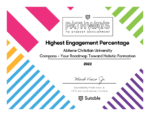
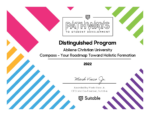 last summer in Philadelphia where ACU Compass won two awards: Highest Student Engagement (91% engagement rate) and The Distinguished Program Award. Suitable provides the technology platform supporting the Compass initiative. Reese said Compass was designed to help students engage in various activities and experiences that help them grow in various ways: intellectually, spiritually, professionally, etc.
last summer in Philadelphia where ACU Compass won two awards: Highest Student Engagement (91% engagement rate) and The Distinguished Program Award. Suitable provides the technology platform supporting the Compass initiative. Reese said Compass was designed to help students engage in various activities and experiences that help them grow in various ways: intellectually, spiritually, professionally, etc.
“We must think about creating an integrated student experience,” Reese said. “Designing curricular and co-curricular activities should be intentional, and we need to communicate to students that these activities all contribute to their holistic development. That is why we designed Compass.”
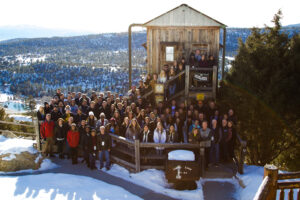
Leadership Summit 2020 attendees (a program of the Lytle Center for Faith and Leadership).
Compass, however, is about more than the teaching that goes on in the classroom. It is about merging different experiences into the classroom, engaging students in projects and internships, and providing opportunities for them to lead in student organizations, etc. It’s about bringing in speakers and employers, going on Study Abroad trips, and participating in the Griggs Center or Lytle Center. It’s not just what is done inside the classroom.
“We have a BBA badge for our pre-business students and are working on reformatting the professional development badge and including a Lytle Center badge,” said M.C. Jennings, Student Engagement and Marketing Manager for COBA. “We want students to be able to keep track of all of their accomplishments and have a portfolio that they will be able to share with future employers that show all of the things they were involved in (Study Abroad, speakers, special projects), holds their resume and cover letter, has academic accomplishments, etc. Eventually, we hope to have more class assignments tied to Compass through Canvas. This is a tool that will enable students to track their academic, professional, personal, and spiritual growth throughout their time at ACU.”
And all of this is part of the holistic learning environment being fostered in COBA, an environment that is necessary for students preparing to enter the world away from ACU.
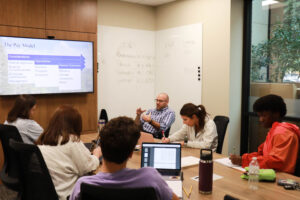
Dr. Matt Deeg takes students out of the regular classroom to learn about HR in a more interactive setting.
“Excellence is demanded of our graduates upon graduation,” said Tim Johnston, Assistant Dean of COBA. “Professors have the tough task of teaching to a high standard and evaluating a student’s ability to complete the assignments to standard. At ACU, our class size and Christian mission make the learning experience very personal. Striking the balance between objective assessment and personal care for an individual student is complex. Our professional development program and alumni connections help support the need for a student to achieve learning excellence.”
But, Reese said, that learning excellence must now include many different facets than might have been required even as few as five years ago.
“Today education is more holistic, and the responsibility of a university – particularly a Christian university – is to help form the whole student. That means that curriculum and pedagogy matter, and additional equipping of students with professional and life skills is vital. Expanding their awareness of diverse cultures and peoples, while developing the type of character that will enhance their careers and bless the world are challenges we address with focused intentionality.”
 While at ACU, Garrett has been heavily involved in academic and campus life pursuits. He has served as Dr. James Prather’s research assistant, researching metacognition, programming error messages, and novice programmers. Seven of his articles have been published on various platforms over the last three years.
While at ACU, Garrett has been heavily involved in academic and campus life pursuits. He has served as Dr. James Prather’s research assistant, researching metacognition, programming error messages, and novice programmers. Seven of his articles have been published on various platforms over the last three years.  A double major in accounting and finance, she has already accepted a job offer at Weaver, an accounting firm in downtown Fort Worth. She is in the process of applying to schools across Texas so she can work toward getting her MBA.
A double major in accounting and finance, she has already accepted a job offer at Weaver, an accounting firm in downtown Fort Worth. She is in the process of applying to schools across Texas so she can work toward getting her MBA. Written by special contributor Lance Fleming
Written by special contributor Lance Fleming That is part of the university with which ACU students have partnered this semester. In addition to donating a warehouse full of airline seats, Southwest has also provided funds for CATIE to build a leatherworking workshop and to provide training for people in the area who are interested (primarily women). The women come from around the region to learn leatherworking and business skills.
That is part of the university with which ACU students have partnered this semester. In addition to donating a warehouse full of airline seats, Southwest has also provided funds for CATIE to build a leatherworking workshop and to provide training for people in the area who are interested (primarily women). The women come from around the region to learn leatherworking and business skills. The students’ client is called Wearsos – the first business to come out of the leather project – and it was started by Corvaglia and Riquelme. Aside from upcycled bags, the company also plans to make other products like passport holders, wallets, luggage tags, and shoes, but according to Phillips, the initial launch will be with three different styles of bags.
The students’ client is called Wearsos – the first business to come out of the leather project – and it was started by Corvaglia and Riquelme. Aside from upcycled bags, the company also plans to make other products like passport holders, wallets, luggage tags, and shoes, but according to Phillips, the initial launch will be with three different styles of bags. case, Wearsos. So far, in four years of teaching the class, each client has been in Costa Rica, although Philips said future classes could certainly take on a domestic client or a client in a foreign country other than Costa Rica. Phillips also said that she wants the students to learn problem-solving and critical-thinking skills each year to serve them when they enter the workforce.
case, Wearsos. So far, in four years of teaching the class, each client has been in Costa Rica, although Philips said future classes could certainly take on a domestic client or a client in a foreign country other than Costa Rica. Phillips also said that she wants the students to learn problem-solving and critical-thinking skills each year to serve them when they enter the workforce. “Finally, we hope the students will learn that consulting (and any cross-cultural project) is a co-creation between the parties involved,” she said. “We do not go to Costa Rica to solve our clients’ problems or fix their issues. We work with the client to develop solutions that will work in their context. We try hard to squash the ‘savior’ complex that people in general – and Americans specifically – sometimes bring to other contexts. We also try to cultivate the idea that everyone has valuable ideas and skills to bring to the project.”
“Finally, we hope the students will learn that consulting (and any cross-cultural project) is a co-creation between the parties involved,” she said. “We do not go to Costa Rica to solve our clients’ problems or fix their issues. We work with the client to develop solutions that will work in their context. We try hard to squash the ‘savior’ complex that people in general – and Americans specifically – sometimes bring to other contexts. We also try to cultivate the idea that everyone has valuable ideas and skills to bring to the project.” The headlines splashed across newspapers and websites around the country last December and into January certainly weren’t flattering for Southwest Airlines. The airline –annually among the leaders of all airlines in the United States in customer satisfaction – wasn’t making anyone happy with thousands of delayed or canceled flights that left travel-weary customers stranded in airports across the country as they scrambled to return home after the holidays.
The headlines splashed across newspapers and websites around the country last December and into January certainly weren’t flattering for Southwest Airlines. The airline –annually among the leaders of all airlines in the United States in customer satisfaction – wasn’t making anyone happy with thousands of delayed or canceled flights that left travel-weary customers stranded in airports across the country as they scrambled to return home after the holidays. Southwest Promise (the company’s COVID response for customers), spearheading the digital self-service and cabin modernization programs, and executing several other impactful
Southwest Promise (the company’s COVID response for customers), spearheading the digital self-service and cabin modernization programs, and executing several other impactful  Roach:
Roach:  the curriculum, and there are things you learn outside the curriculum. What ACU does is teach you that you can balance a lot of things at once. At ACU, you learn to balance your walk with Christ and academics. You’re blending two things. But I had three when you added athletics (Roach was on the ACU men’s basketball team). Understanding how to pursue and balance what is important to you at once is a skill that can continue to bless your life. I’ve also been lucky to have a father who has given me guidance along the way. He taught me that if you consult with God and walk with Him and abide with Him, He has your back, which keeps everything in perspective. He’s given me a great example; somebody to watch and do things with the right intent.
the curriculum, and there are things you learn outside the curriculum. What ACU does is teach you that you can balance a lot of things at once. At ACU, you learn to balance your walk with Christ and academics. You’re blending two things. But I had three when you added athletics (Roach was on the ACU men’s basketball team). Understanding how to pursue and balance what is important to you at once is a skill that can continue to bless your life. I’ve also been lucky to have a father who has given me guidance along the way. He taught me that if you consult with God and walk with Him and abide with Him, He has your back, which keeps everything in perspective. He’s given me a great example; somebody to watch and do things with the right intent.



 Engagement and Marketing Manager in COBA – went to an ag store in the area and bought a feed trough with the hope that it would need to be used that day. When the staff learned that it would be necessary for four students, they formed a “hot water bucket brigade” to fill the trough for the baptisms, which would take place outside in 20-degree temperatures.
Engagement and Marketing Manager in COBA – went to an ag store in the area and bought a feed trough with the hope that it would need to be used that day. When the staff learned that it would be necessary for four students, they formed a “hot water bucket brigade” to fill the trough for the baptisms, which would take place outside in 20-degree temperatures.



 last summer in Philadelphia where ACU Compass won two awards: Highest Student Engagement (91% engagement rate) and The Distinguished Program Award. Suitable provides the technology platform supporting the Compass initiative. Reese said Compass was designed to help students engage in various activities and experiences that help them grow in various ways: intellectually, spiritually, professionally, etc.
last summer in Philadelphia where ACU Compass won two awards: Highest Student Engagement (91% engagement rate) and The Distinguished Program Award. Suitable provides the technology platform supporting the Compass initiative. Reese said Compass was designed to help students engage in various activities and experiences that help them grow in various ways: intellectually, spiritually, professionally, etc. 
